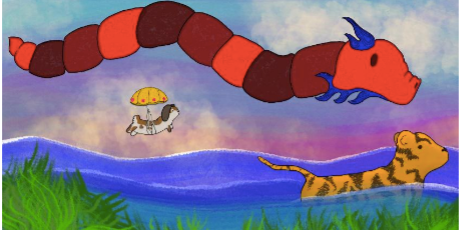Your cart is currently empty.

Our First Encounter With Art
I recently read about an art exhibit in Portsmouth, New Hampshire that inspired me. This exhibit just recently closed at the end of September, and I genuinely hope it attracted a lot of local attention, because I, myself would have loved to see it in person. Built to celebrate the heritage of children’s books in northern New England, the exhibit featured original artwork by over 30 illustrators, plus all sorts of workshops, bookmaking and play stations, story hours and more. Not only did the exhibit itself sound wonderful, but a statement included by one of their guest curators stuck with me. To paraphrase, she said that as a historical society, they strived to meet people where they first encountered art – children’s books.
The truth in those words, when you really think about them, is fascinating. Sure, when we were children, we had paints and blocks and such for our creative expression, but even before we could use those objects, we had stories. Our caregivers would read to us while we poked at the pictures and tried to make sense of it all. It’s incredible to think that’s the first time we experienced art, and it’s even more incredible to think about what you read early in your childhood and how it affected who you are as a creative today.
Children’s literature has been, and always will be, extremely important. They’re educational in so many ways: by addressing common children’s problems and advocating for healthy solutions, by allowing a child to experience a culture or community different from their own, and by giving them the unconscious verbal and intellectual skills they need to further their development. Which is why discovering, developing, and publishing children’s books of the highest caliber is a large part of Oprelle Publication’s mission.
We’ve always carried a passion for fostering child development through reading, which is why we started our ‘Big Hats’ program, specifically designed to get kids reading our highlighted books with a fun methodology. Oprelle is adding two new titles to this program, Llama Locomotion by Dr. Deborah Sharp Molchan and The Great Animal Race by Paula Zhou.
Llama Locomotion is all about exercise, and how moving the body correlates to improved learning and helps with other common children’s issues, like being unable to sit still in school. The Great Animal Race offers a fictionalized account of how the Chinese zodiacs came about, effectively entertaining and informing little readers about a topic and culture they may know nothing about yet. These are two upcoming children’s books that we are very proud of, and if I were stocking a shelf for a child, I would want to include educational texts like these.
And it’s not just the words themselves that are important in children’s literature, the illustrations play a very equal and necessary part in child development. The illustrations are what the child can fully see and understand, especially before they can read. We’re incredibly fond of the mesmerizing art produced by Emily Hercock (Llama Locomotion) and Oprelle’s very own Jenna Croftcheck (The Great Animal Race). They’ve both perfectly captured the wonder seen through a child’s eye.
I would argue that children’s books are the foundation of our lives. All the stories, myths, and fables we were told are what mold us, inspire us, and what make us human. They’re undeniably meaningful, powerful, and crucial to our literary sphere. As adorable and fun as children’s books are, let’s remember to take them seriously.
Here's the link to the children’s book exhibit for additional reading: https://www.nhmagazine.com/exhibit-emphasizes-the-importance-of-childrens-books/
Leave a Reply